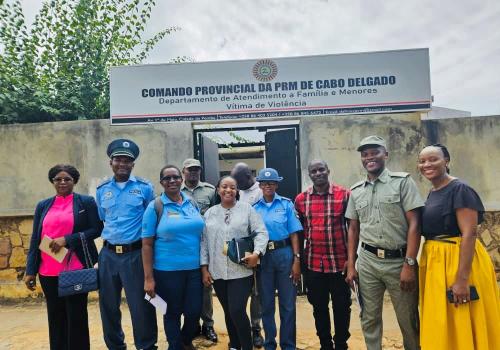The Southern African Development Community (SADC) Secretariat, in collaboration with the SADC Mission in Mozambique (SAMIM), conducted capacity building workshops for community representatives and service providers in Pemba, Cabo Delgado Province, Mozambique.
The workshops were convened under the theme “Prevention and Response to Gender Based Violence in humanitarian settings,” in line with the SAMIM mandate on the protection of civilians. The workshops, which were held from 11-14 April 2023 and 17 – 21 April 2023, unpacked the roles of community members in identifying and referring gender based violence cases, as well as discussed the roles and responsibilities and challenges faced by key service providers in ensuring effective service delivery and coordination of GBV interventions in emergency, conflict and post-conflict settings. A total number of 80 participants were drawn from all the 17 districts of Cabo Delgado province.
In his opening remarks, His Excellency, Prof. Mpho G. Molomo, Head of Mission SAMIM and Special Representative to the Chair of the Organ, noted that gender based violence knows no social, economic or national boundaries and that in conflict settings, women and girls are primarily and increasingly targeted by the use of sexual violence, as a tactic of war, which is a manifestation of gender inequality and systemic gender based discrimination. He added that Cabo Delgado province, which has been experiencing acts of terrorism and violent extremism since October 2017, has not been spared from gender based violence and that terrorist groups have continued attacking villages, thereby displacing communities, internally displaced persons (IDPs) and returnee populations in the Province. In this regard, women and girls are at risk of multiple forms of gender based violence before, during and after being forcibly displaced in both IDP camps and in areas where they reside.
The Acting Director of the Organ on Politics, Defence and Security Affairs, Ms. Kealeboga Moruti stated that high rates of GBV incidences in emergency and humanitarian settings are due to family separation; disruption of law and order; poor state protection; weakened infrastructure; changing cultural and gender norms and that GBV, therefore, requires a multi-sectoral response as well as strengthening of collaboration amongst key service providers and stakeholders for services to be offered effectively and in a well-coordinated manner.
The workshops discussed among others, regional legislative instruments, national GBV legislative tools, referral mechanisms, cultural and traditional values and beliefs and included field visits to various service delivery points, such as the GBV Police Victim Centre in Pemba.
Community representatives who attended the workshop as Champions of Change buttressed prevention as pivotal in the GBV response and recommended concerted efforts in strengthening engagements with schools, and religious and faith-based organizations to intensify preventive measures.
The Director of Gender, Child and Social Action, Ms. Regina Martins Muankongue, affirmed the government’s commitment to continue collaborating with SAMIM in the implementation of gender programmes in Cabo Delgado province. She thanked the SADC Secretariat for the technical and financial support towards hosting of the important workshops. Ms. Muankongue urged the participants to replicate lessons learnt from the workshops in their districts, enhance coordination and strengthen referral mechanisms. She also appealed to service providers to collaborate with the trained Champions of Change in the fight against the scourge in the districts.
The workshops were facilitated by the Support to Peace and Security in the SADC Region (SPSS) Programme which is funded by the European Union to strengthen the SADC region in areas of conflict prevention, management as well as public and human security.

